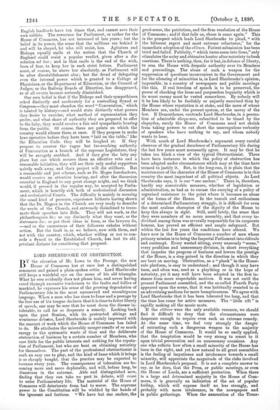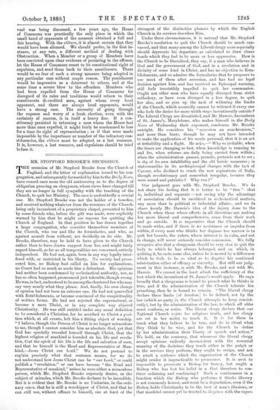LORD SHERBROOKE ON OBSTRUCTION.
BY the elevation of Mr. Lowe to the Peerage, the new House of Commons has at once lost a distinguished ornament and gained a plain-spoken critic. Lord Sherbrooke still keeps a watchful eye on the scene of his old triumphs. What he sees evidently does not please him, and never having erred through excessive tenderness to the faults and follies of mankind, he expresses his sense of the growing degradation of Parliamentary life in the most unreserved and unambiguous language. When a man who has risen to fame and a peerage by the free use of his tongue declares that it is time to fetter liberty of speech, one may be sure that he must deem the disease in- tolerable, to call for so desperate a remedy. Looking back upon the past Session, with its protracted sittings and wearisome debates, Lord Sherbrooke is mainly impressed with the amount of work which the House of Commons has failed to do. He attributes the miserably meagre results of so much energy to the systematic waste of time and the deliberate obstruction of business by a certain number of Members, who care little for the public interests and nothing for the reputa- tion of Parliament, but who are bent on obtaining notoriety for themselves. The part of the professional obstructionist is such an easy one to play, and the kind of fame which it brings is so cheaply bought, that the practice may be expected to increase every year. The consequences of toleration are be- coming more and more deplorable, and will, before long, be disastrous in the extreme. Able and distinguished men, finding that they can take no part in debate, will cease to enter Parliamentary life. The material of the House of Commons will deteriorate from bad to worse. The supreme power in the Constitution will be wielded by the hands of the ignorant and factious. "We have but one anchor, the good-sense, the patriotism, and the firm resolution of the House of Commons ; and if that fails us, chaos is come again." This is the prospect which leads Lord Sherbrooke to plead," with the bitterest regret and most extreme reluctance," for the immediate adoption of the chlture. Patient submission has been tried and failed. Publicity," which turns asses into lions," only stimulates the noisy and obtrusive hunter after notoriety to fresh exertions. There is nothing, then, for it but, in defence of liberty, to arm the House with despotic authority over its Members and proceedings. The abuse of such a weapon for the suppression of questions inconvenient to the Government and for the silencing of minorities is, in Lord Sherbrooke's opinion, impossible, in a country of newspapers and public meetings like this. If real freedom of speech is to be preserved, the power of checking the loose and purposeless loquacity which is its worst enemy must be vested somewhere. By nobody will it be less likely to be foolishly or unjustly exercised than by the House whose reputation is at stake, and the mass of whose Members are, under the present system, at the mercy of the few. If Demosthenes, contends Lord Sherbrooke, in a perora- tion of admirable eloquence, submitted to be timed by the clepsydra, surely the House of Commons need not shrink from taking powers to cut short the unscrupulous verbosity of speakers who have nothing to say, and whom nobody wants to hear.
With much of Lord Sherbrooke's argument every careful observer of the gradual decadence of Parliamentary life during the last few years must necessarily agree. It may be that he takes too black a view of the typical Obstructionist. There have been instances in which the policy of obstruction has been adopted under circumstances which may at the time have seemed to justify it. But, in the long-run, it is plain that the maintenance of the character of the House of Commons is in this country the most important of all political objects. As Lord Sherbrooke says, it is our "one anchor." There is, therefore, hardly any conceivable measure, whether of legislation or administration, so bad as to excuse the carrying of a policy of organised resistance to the point where it becomes an abuse of the forms of the House. In the tumult and enthusiasm of a determined Parliamentary struggle, it is difficult for even the most zealous champion of the dignity of the House to keep this always in sight. Still, until lately, the sense that they were members of no mean assembly, and that every in- dividual among them was severally responsible for its corporate honour, has proved an efficient and ample safeguard. But within the last few years the conditions have altered. We have now in the House of Commons a number of men whose primary mission is to bring the Imperial Parliament into ridicule and contempt. Every wasted sitting, every unseemly "scene," every profitless and unnecessary division, in short everything that impedes the progress of business and lowers the prestige of the House, is a step gained in the direction in which they are bent on moving. Obstruction, as a "plank" in the Home- rule platform, is easy to understand ; and though it may have been, and often was, used as a plaything or in the hope of notoriety, yet it may well have been adopted in the first in- stance from more respectable motives. It was not until the
present Parliament assembled, and the so-called Fourth Party appeared upon the scene, that it was habitually resorted to as
an advertising medium for mere bumptiousness. We agree with Lord Sherbrooke that it has been tolerated too long, and that the time has come for active measures. The "little rift" is rapidly making all the music mute.
If the cloture were the only available resource, we should find it difficult to deny that the circumstances were
desperate enough to require even such an extreme remedy.
At . the same time, we feel very strongly the danger of entrusting such a dangerous weapon to the majority
of the House of Commons. It would be so easily applied, that the temptation would be very strong to resort to it upon trivial provocation and on unnecessary occasions. Any one who reflects how often a small minority of the House has been in the right, and yet how natural to all great assemblies is the feeling of impatience and intolerance towards a small minority, will appreciate the magnitude of the risks involved in Lord Sherbrooke's proposal. It is not a complete answer to say, as he does, that the Press, or public meetings, or even
the House of Lords, are a sufficient protection. When there
is a large and determined majority in the House of Com- mons, it is generally an indication of the set of popular
feeling, which will express itself no less strongly, and probably with more intolerance, in the newspapers and in public gatherings. When the annexation of the Trans-
vaal was being discussed, a few years ago, the House of Commons was practically the only place in which the small band of opponents of the measure obtained a full and fair hearing. With the cloture, it is almost certain that they would have been silenced. We should prefer, in the first in- stance, at any rate, a different method of dealing with Obstruction. When a Member or a group of Members have been convicted upon clear evidence of persisting in the offence, let the House of Commons resort to its constitutional right of expulsion, and send them back to their constituents. There would be no fear of such a strong measure being adopted in any particular case without ample reason. The punishment would be impressive as a deterrent to others, and at the same time a severe blow to the offenders. Members who had been expelled from the House of Commons for disregard of its rules and traditions would return to their constituents discredited men, against whom every local opponent, and there are always local opponents, would have a strong case. The necessity of going through the expense and worry of a fresh election, even with the certainty of success, is in itself a heavy fine. If a con- stituency persisted in returning a man whom the House had more than once expelled, it might fairly be condemned to lose for a time its right of representation ; or if that were made impossible by the importance or number of the refractory con- stituencies, the cloture must be adopted, as a last resource. It is, however, a last resource, and expulsions should be tried before it.



































 Previous page
Previous page